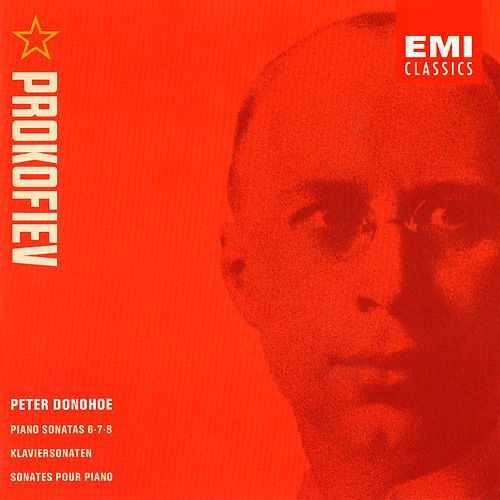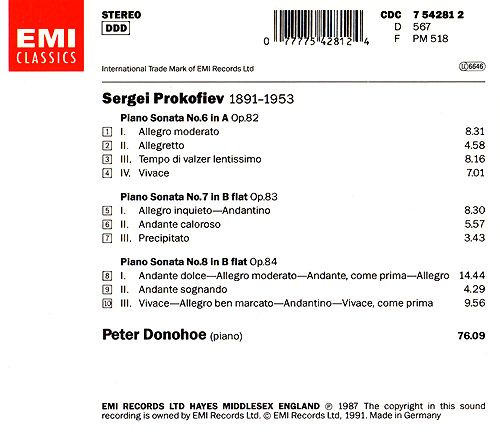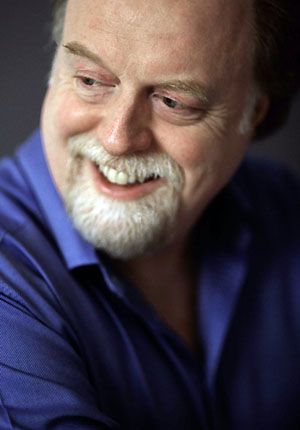wimpel69
11-10-2014, 05:21 PM
EAC-FLAC link below. This is my own rip. Complete artwork,
LOG and CUE files included. Do not share. Buy the original!
Please leave a "Like" or "Thank you" if you enjoyed this!
Prokofiev's 'War Sonatas' (Piano Sonatas Nos. 6-8) comprise ten separate movements which Prokofiev
conceived in 1939 at Kislovodsk, at the time he met Mira Mendelson, who would become his second wife.
He originally worked on them at the same time, while he was also composing his Fifth Symphony. However,
work was interrupted in autumn 1939 for a commission to write a cantata for Stalin's 60th birthday, after
which he concentrated on finishing Sonata No.6. This was just as the Second World War started in September
1939, Britain having declared war on Hitler's Germany after its invasion of Poland � although Soviet Russia's
entry into the fray did not actually occur until August 1941, with Hitler unilaterally breaking his non-aggression
pact with Stalin by invading Russia.
Then, like most of the leading artists in Moscow at the time, Prokofiev was evacuated by rail to Nalchik in
the northern Caucasus, three days away from the capital, taking with him sketches for the ballet Cinderella
and the opera War and Peace as well as those for his Seventh and Eighth Sonatas.
Meanwhile, Prokofiev himself had given the premi�re of the Sixth Sonata on air, in a Moscow radio
broadcast on 8 April 1940. Earlier that year he had given the work a private performance in the apartment
of Pavel Lamm, which was attended by pianist Sviatoslav Richter, who later reported: "The remarkable
clarity of style and structural perfection of the music amazed me. I had not heard anything like it before.
The composer, with barbaric audacity, breaks with the ideals of the Romantics and includes the shattering
pulse of the 20th Century in his music." The Sixth Sonata's first public performance was given on 26
November 1940, in Moscow by Richter.
However, after the war, Soviet authorities sought music which was easy on the ear. In February 1948
Prokofiev, along with Shostakovich, was bitterly criticised by the Cultural Commissar Andrei Zhdanov,
and his Sixth Sonata was effectively denounced when its first recording, made in 1947 by Victor
Merzhanov, was withdrawn, with both original and all copies destroyed.
Meanwhile his next sonata � the Seventh � had already received the Stalin Prize (second degree).
Prokofiev completed it in autumn 1942, following another evacuation, this time to the bustling southern
city of Tbilisi, and it was again Richter who gave the premi�re in the Hall of the Home of the Unions on
18 January 1943, a month after Prokofiev returned to Moscow, and having learned the score in just four
days. Richter commented: "The work was extremely successful... Prokofiev was present and was
called on stage... and everyone wanted to hear the Sonata a second time. The listeners grasped the
spirit of the work which clearly reflected their innermost feelings." Two months later the work was
awarded the Stalin Prize and it was also deemed worthy of promotion abroad. Both Emil Gilels and
Vladimir Horowitz championed it, the latter giving the US premi�res of all three 'War Sonatas.'
For those who know Prokofiev's reputation for enfant-terrible musical iconoclasm, and recognise a
similar soundworld in both his belligerent Sixth and Seventh Sonatas, the Eighth Sonata may come
as something of a shock. Yes, there are still the mechanistic references to the destructive nature of
war, but there is also the tenderest lyricism. And yet we should not be too surprised, as Prokofiev
always had the facility to turn to the simplest and most affecting melodic lines and harmonies, and
here his direct inspiration was Mira, to whom the Sonata is dedicated. Prokofiev signed and dated
the score "Ivanova-Soritov, 29 June 1944" with the premi�re taking place six months later in
Moscow, on 30 December.

Music Composed by
Sergei Prokofiev
Played by
Peter Donohoe

"Donohoe's performances of the 'War Sonatas' are the result of a long standing relationship
with the music�and it shows. . . . Donohoe favours (as does Lill on ASV) a more broadly
symphonic, more cogently unified view of the work, and frequently sheds light on a host of
hidden subtleties�harmonic and rhythmic, as well as inner details. These qualities are also
prevalent in Sonatas Nos. 7 and 8. Immediate reactions to Donohoe's account of the Seventh
Sonata were, I have to admit, not entirely favourable . . . . Nevertheless this is a performance
that I find myself warming to more on each successive hearing. The Eighth on the other hand
I found immediately impressive. The first movement has a fine sense of flow, with plenty of
dynamic contrast . . . . But even more impressive I felt was his overall sense of structure,
not only within individual movements, but throughout the sonata as a whole. The finale
is a veritable tour de force. . . ."
Michael Stewart, Gramophone

DOWNLOAD LINK - https://mega.co.nz/#!qpYU1CgK!3VSNWH1WEWG9aHm-nhdzMvYQa0VaNWdJEbl7IAw06yM
Source: EMI Classics CD, 1991 (my rip!)
Format: FLAC(RAR), DDD Stereo, Level: -5
File Size: 249 MB (incl. artwork, booklet, log & cue)
Enjoy! Don't share! Buy the origina! Please leave a "Like" or "Thank you" if you enjoyed this! :)
LOG and CUE files included. Do not share. Buy the original!
Please leave a "Like" or "Thank you" if you enjoyed this!
Prokofiev's 'War Sonatas' (Piano Sonatas Nos. 6-8) comprise ten separate movements which Prokofiev
conceived in 1939 at Kislovodsk, at the time he met Mira Mendelson, who would become his second wife.
He originally worked on them at the same time, while he was also composing his Fifth Symphony. However,
work was interrupted in autumn 1939 for a commission to write a cantata for Stalin's 60th birthday, after
which he concentrated on finishing Sonata No.6. This was just as the Second World War started in September
1939, Britain having declared war on Hitler's Germany after its invasion of Poland � although Soviet Russia's
entry into the fray did not actually occur until August 1941, with Hitler unilaterally breaking his non-aggression
pact with Stalin by invading Russia.
Then, like most of the leading artists in Moscow at the time, Prokofiev was evacuated by rail to Nalchik in
the northern Caucasus, three days away from the capital, taking with him sketches for the ballet Cinderella
and the opera War and Peace as well as those for his Seventh and Eighth Sonatas.
Meanwhile, Prokofiev himself had given the premi�re of the Sixth Sonata on air, in a Moscow radio
broadcast on 8 April 1940. Earlier that year he had given the work a private performance in the apartment
of Pavel Lamm, which was attended by pianist Sviatoslav Richter, who later reported: "The remarkable
clarity of style and structural perfection of the music amazed me. I had not heard anything like it before.
The composer, with barbaric audacity, breaks with the ideals of the Romantics and includes the shattering
pulse of the 20th Century in his music." The Sixth Sonata's first public performance was given on 26
November 1940, in Moscow by Richter.
However, after the war, Soviet authorities sought music which was easy on the ear. In February 1948
Prokofiev, along with Shostakovich, was bitterly criticised by the Cultural Commissar Andrei Zhdanov,
and his Sixth Sonata was effectively denounced when its first recording, made in 1947 by Victor
Merzhanov, was withdrawn, with both original and all copies destroyed.
Meanwhile his next sonata � the Seventh � had already received the Stalin Prize (second degree).
Prokofiev completed it in autumn 1942, following another evacuation, this time to the bustling southern
city of Tbilisi, and it was again Richter who gave the premi�re in the Hall of the Home of the Unions on
18 January 1943, a month after Prokofiev returned to Moscow, and having learned the score in just four
days. Richter commented: "The work was extremely successful... Prokofiev was present and was
called on stage... and everyone wanted to hear the Sonata a second time. The listeners grasped the
spirit of the work which clearly reflected their innermost feelings." Two months later the work was
awarded the Stalin Prize and it was also deemed worthy of promotion abroad. Both Emil Gilels and
Vladimir Horowitz championed it, the latter giving the US premi�res of all three 'War Sonatas.'
For those who know Prokofiev's reputation for enfant-terrible musical iconoclasm, and recognise a
similar soundworld in both his belligerent Sixth and Seventh Sonatas, the Eighth Sonata may come
as something of a shock. Yes, there are still the mechanistic references to the destructive nature of
war, but there is also the tenderest lyricism. And yet we should not be too surprised, as Prokofiev
always had the facility to turn to the simplest and most affecting melodic lines and harmonies, and
here his direct inspiration was Mira, to whom the Sonata is dedicated. Prokofiev signed and dated
the score "Ivanova-Soritov, 29 June 1944" with the premi�re taking place six months later in
Moscow, on 30 December.

Music Composed by
Sergei Prokofiev
Played by
Peter Donohoe

"Donohoe's performances of the 'War Sonatas' are the result of a long standing relationship
with the music�and it shows. . . . Donohoe favours (as does Lill on ASV) a more broadly
symphonic, more cogently unified view of the work, and frequently sheds light on a host of
hidden subtleties�harmonic and rhythmic, as well as inner details. These qualities are also
prevalent in Sonatas Nos. 7 and 8. Immediate reactions to Donohoe's account of the Seventh
Sonata were, I have to admit, not entirely favourable . . . . Nevertheless this is a performance
that I find myself warming to more on each successive hearing. The Eighth on the other hand
I found immediately impressive. The first movement has a fine sense of flow, with plenty of
dynamic contrast . . . . But even more impressive I felt was his overall sense of structure,
not only within individual movements, but throughout the sonata as a whole. The finale
is a veritable tour de force. . . ."
Michael Stewart, Gramophone

DOWNLOAD LINK - https://mega.co.nz/#!qpYU1CgK!3VSNWH1WEWG9aHm-nhdzMvYQa0VaNWdJEbl7IAw06yM
Source: EMI Classics CD, 1991 (my rip!)
Format: FLAC(RAR), DDD Stereo, Level: -5
File Size: 249 MB (incl. artwork, booklet, log & cue)
Enjoy! Don't share! Buy the origina! Please leave a "Like" or "Thank you" if you enjoyed this! :)